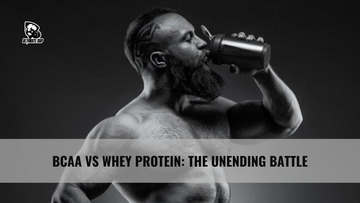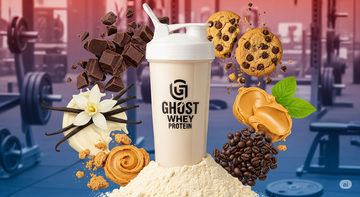BCAA vs Whey Protein, which is the best option for you? Let's find out with Ultimate Sup Singapore.
Protein powders and BCAAs have a lot in common. They're both famous, science-backed supplements that help you create lean muscle, recover faster, and perform better. So, it's understandable if you're confused between BCAA vs Whey protein. If you want to use any supplement to meet your fitness goals, having an excellent nutritional understanding can help you get far more significant outcomes. Keep reading with Ultimate Sup Singapore to discover the secret of branched-chain amino acids vs whey protein.
Table Of Contents
TL;DR BCAA vs Whey Protein

What Is Whey Protein?

Whey protein is the most common milk protein. It is the liquid that remains after manufacturers curdle and strain the milk. Whey includes plenty of easily absorbed proteins. All of your body's tissues, including your muscles, rely on these vital nutrients for growth and repair. If you don't get enough of them, your body and muscles will suffer.
By using whey protein, you can enhance your protein level, apart from obtaining protein from meals. Whey protein includes all nine necessary amino acids required for the body's efficient functioning. You must get these essential amino acids from food because the body does not synthesize them.
How Much Protein Do You Need?
Protein consumption of 0.8 to 0.83 grams per kilogram of body mass is recommended by both US and EU governments. But, if that's all you eat, don't expect to grow much muscle.
If you lift weights to gain muscle and strength, you will require more protein than an average person. In that case, you need to aim for at least 1.6–1.7 grams of protein per kilogram of body mass every day to grow muscle. Depending on different nutritional plans, you could benefit from up to 2.7 grams of protein per kilogram of body daily.
What Are BCAAs?

BCAAs are essential amino acid groups. To synthesize, each adult needs almost 20 amino acids. Branched-chain amino acids can then produce nutrients that will nourish and develop your body. Among the nearly 20 types of amino acids, nine are particularly important.
The Branched-chain amino acid group includes three amino acids with branching structures. They are Leucine, Isoleucine, and Valine.
How Much BCAAs Do You Need?
BCAAs are helpful to athletes, those who engage in high-intensity or long-duration training. Supplemental BCAA intake with doses of 4-20 g per day has been found to be safe for healthy adults. Longer-term intake, for at least one week, shows more considerable benefits than short-term ingestion. To increase muscle protein synthesis, you should consume 2-3g leucine between meals, before, during, and after workouts. Smaller doses of BCAAs taken multiple times for a long training session are likely to help delay fatigue and reduce muscle tissue breakdown.
BCAA vs Whey Protein: Muscle Growth
BCAAs For Muscle Growth
There is almost no study and very little proof for any benefits associated with BCAA supplementation and long-term muscle building. Although BCAA manufacturers would have you believe otherwise, all claims of muscle gain are based on short-term studies. BCAAs, as previously stated, fall short in this area as well.
In a study published in 2024, 30 postmenopausal women supplemented their diet with 9 grams of BCAAs per day or placebo while strength-training three times per week. Although lifting weights helped both groups grow muscle mass and strength, as expected, the BCAA supplement is shown to bring no effects at all.
More recently, a study of all available scientific evidence concluded that ingesting more BCAAs in addition to your regular diet has no discernible benefits. All of the essential amino acids are necessary for muscle development. You can find all of them in common protein sources, and BCAAs have little impact on their own.
Whey Protein For Muscle Growth
Scientists studied the effects of protein supplementation on muscle mass and strength in healthy people in a 2017 meta-analysis. The researchers used data from 49 controlled studies to establish their findings. One group of strength-training men and women drank a protein shake a day, and a control group received a placebo drink without any protein. Besides, whey protein was the most common protein used in this research.
The test, which lasted up to 52 weeks, drew in 1,863 men and women. To put it another way, scientists have a lot of information about how whey protein supplements promote muscle building.
On average, members in the protein groups raised their daily protein consumption from 1.4 to 1.8 grams per kilogram of body mass.
Strength training alone resulted in a 1.1-kilogram rise in fat-free mass, according to the findings. Compared to the placebo group, participants who added a protein shake to their daily diet gained 300 grams of fat-free mass. Untrained lifters acquired less fat-free mass due to the increased protein, whereas trained lifters gained a massive 750 grams of fat-free mass on average compared to the placebo group.
According to these figures, a daily protein shake can help you gain more than 30% more muscle mass during a strength training session.
Of course, these figures must be viewed in context. Adding the same quantity of protein from ordinary foods will almost certainly produce the same favorable benefits. However, as long as you increase your overall daily protein intake, a protein shake is a simple and cost-effective option to stimulate muscle building.
Whey protein, as part of a healthy diet, appears to be an excellent approach to enhance muscle mass increases, according to a 2019 analysis.
BCAA vs Whey Protein For Muscle Growth: Whey Protein Powder is the winner.

BCAA vs Whey Protein For Performance
BCAAs can minimize fatigue during exercise and possibly help you exercise for longer before becoming exhausted, according to research. This is especially true while doing endurance training or working out in the heat.
Serotonin is most likely involved in BCAAs' effects on performance and weariness. You can delay fatigue by consuming BCAAs before a workout.
BCAAs save muscle glycogen, your most vital fuel for strenuous activity. In principle, this should help you perform better during a long training session, but studies haven't shown that this is the practice case. Moreover, BCAAs help you raise your workout capacity by improving your lactate threshold.
However, you will find it difficult to find research on whey in this area. Whey, on the other hand, is likely to be ineffective. Because the liver doesn’t digest branched-chain amino acids in supplement form, they reach your muscles and brain practically instantly.
BCAA vs Whey Protein For Performance: BCAA is the winner.
BCAA vs Whey Protein For Muscle Soreness
Delayed-onset muscle soreness, or DOMS, is the medical term for aching muscles after activity. You know how DOMS feels if you work out. It frequently occurs when you boost your workout intensity suddenly or try something new.
BCAAs have been shown to help with muscle recovery. You might anticipate feeling less sore after taking a BCAA supplement after your workouts. Because the studies compare BCAAs against nothing, having a conventional protein-rich lunch after your workout may have the same effect.
Whey protein supplements have only a few studies to back them up. The available studies are poorly designed and contain a small number of participants. However, evidence suggests that drinking whey protein after a workout may help to minimize muscular pain. A frequent protein-rich diet could provide similar benefits.
BCAA vs Whey Protein For Muscle Soreness: It’s a tie!
To conclude, you need to choose between BCAA vs Whey protein based on your fitness purpose. On the one hand, whey is a high-quality, low-cost source of muscle-building protein. On the other hand, BCAAs may be useful in certain situations like muscle recovery. Just choose the one you need and purchase it at the most affordable price at Ultimate Sup Singapore.
Related Articles:










